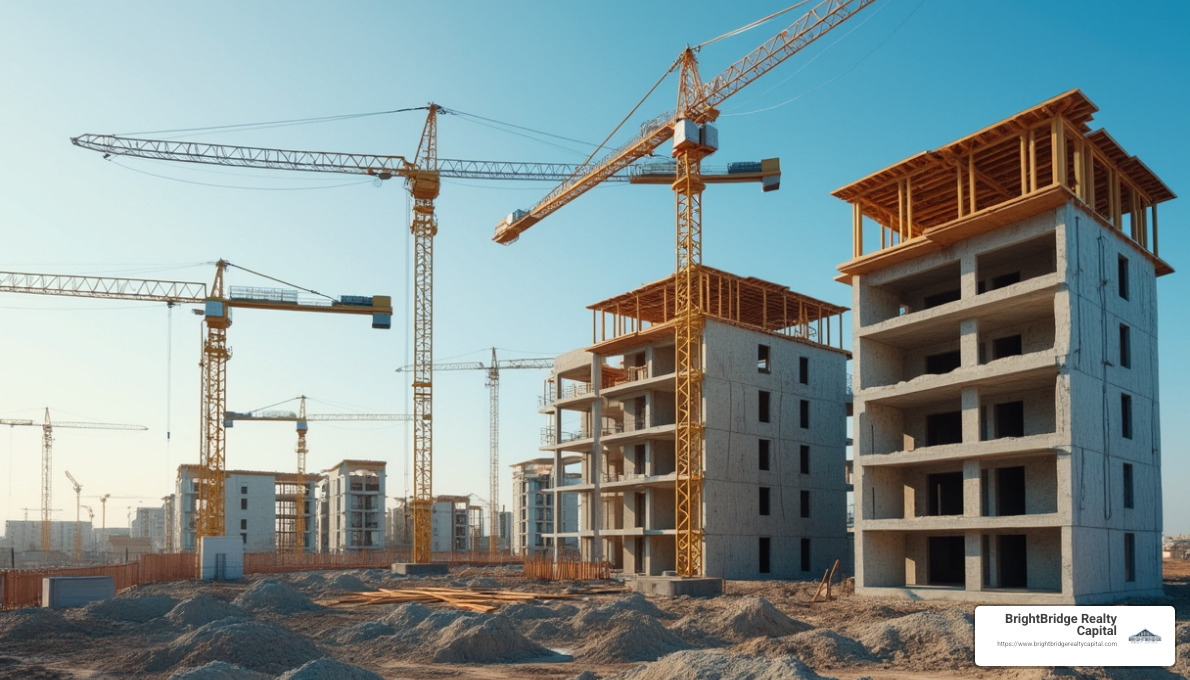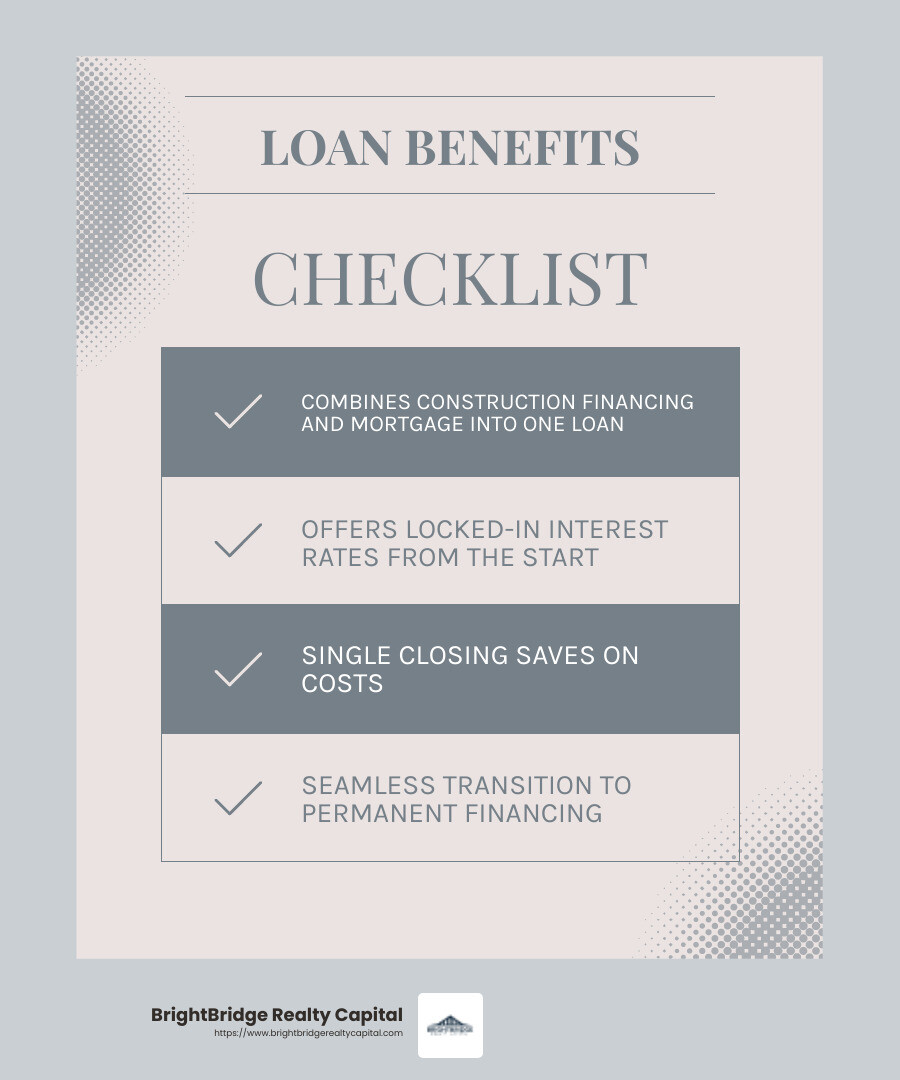Navigating Construction Loan Rates: A Guide to Today's Market

Construction loan rates today are a key concern for anyone looking to invest in real estate development or home building projects. These rates can fluctuate significantly, affecting the overall cost of financing your project. To give you a quick overview:
- Interest Rates typically range from 4% to 7%, depending on various factors like the type of construction loan and your creditworthiness.
- Loan Types include construction-to-permanent and stand-alone construction loans, each with its own terms and conditions.
- Down Payments usually start at 20%, but options like using owned land as part of the down payment can lower initial costs.
Navigating construction loan rates is crucial for real estate investors, especially those dedicated to high-reward ventures like fix-and-flip projects or expanding rental portfolios. These loans provide the flexibility needed for building from the ground up, influencing your project's financial viability.
The world of real estate financing is complex, with construction loans adding another layer of intricacy. At BrightBridge Realty Capital, understanding these nuances is critical for making informed investment decisions.

Explore more about construction loan rates today:
Understanding Construction Loan Types
When it comes to construction loans, there are two main types to consider: stand-alone loans and construction-to-permanent loans. Both offer unique benefits and challenges, and understanding these can help you choose the right option for your project.
Stand-Alone Loans
Stand-alone construction loans are essentially short-term financing solutions. They cover the costs of building your home but require you to secure a separate mortgage once construction is complete. This type of loan is typically for a one-year term.
- Interest Rates: These loans often come with higher interest rates due to the increased risk associated with new construction. Rates can fluctuate, so borrowers must be prepared for potential changes during the building process.
- Flexibility: Stand-alone loans might be suitable if you plan to sell your existing home or have other sources of funds to pay off the construction debt once your new home is built.
Construction-to-Permanent Loans
A construction-to-permanent loan simplifies the process by combining both the construction financing and the mortgage into a single loan. This means you only go through one application process and one closing.
- Interest Rates: Typically, these loans offer locked-in interest rates at the start of construction, providing more stability compared to stand-alone loans.
- Single Closing: With only one closing, you save on closing costs, and the transition from construction to permanent financing is seamless.

Interest Rates
Construction loan rates today are influenced by several factors, including the type of loan you choose. Generally, construction-to-permanent loans offer more predictable rates, which can be beneficial in a fluctuating market. However, both loan types are subject to market trends, risk assessments, and your creditworthiness.
Understanding these options and how interest rates can impact your financing is crucial. At BrightBridge Realty Capital, we help you steer these complexities to find the best solution for your needs.
Factors Influencing Construction Loan Rates Today
When diving into construction loan rates today, it's important to know what influences these rates. Here's a breakdown of the key factors:
Risk Assessment
Construction loans are seen as riskier than traditional mortgages. Why? Because there's no existing home to use as collateral. Lenders evaluate several aspects to assess risk:
- Creditworthiness: Your credit profile plays a big role. A strong credit score can lead to lower rates.
- Loan-to-Value Ratio: This ratio compares the loan amount to the appraised value of the property. A lower ratio can mean less risk for lenders, potentially lowering your interest rate.
- Project Viability: Lenders look at the construction plan. A well-detailed plan with a reputable builder can reduce perceived risk.
Market Trends
Just like any other financial product, construction loan rates are affected by market conditions. Here are a few trends that can influence rates:
- Economic Conditions: Interest rates can rise during economic growth or fall during downturns.
- Prime Rates: Construction loan rates often follow prime rates. If prime rates go up, expect your construction loan rates to follow.
- Supply and Demand: High demand for loans can drive up rates, while lower demand might push them down.
Loan Terms
The specific terms of your loan also impact the interest rate:
- Loan Duration: Short-term loans might have higher rates due to the increased risk of fluctuations over a brief period.
- Type of Loan: As discussed earlier, construction-to-permanent loans often provide more stability with locked-in rates, whereas stand-alone loans might have variable rates.
- Payment Structure: Some loans allow interest-only payments during construction, which can ease cash flow but might affect the overall rate.
Navigating these factors can be complex, but understanding each one helps in making informed decisions. At BrightBridge Realty Capital, we guide you through these nuances to ensure you secure the best possible rates for your construction project.
Comparing Construction Loan Rates Today
When it comes to construction loan rates today, understanding how they stack up is crucial. Here's a simple guide to help you compare and contrast:
Interest Rate Comparison
Construction loan rates are typically higher than traditional mortgage rates. This is due to the increased risk involved with financing a project that isn't yet complete. Here’s how they generally compare:
- Construction Loans: These rates can be 1% to 5% higher than standard mortgage rates. They fluctuate with the prime rate and economic conditions.
- Traditional Mortgages: Usually lower because they are secured by existing property.
Loan Fees
Fees are an essential part of comparing construction loans. Here’s what to look out for:
- Origination Fees: These are upfront charges for processing the loan. They can vary widely between lenders.
- Inspection Fees: As construction progresses, lenders may require inspections to release funds. Each inspection can carry a fee.
- Closing Costs: With construction-to-permanent loans, you might save money by having just one closing instead of two separate ones.
APR (Annual Percentage Rate)
The APR gives a more comprehensive view of the loan's cost, including fees and interest. It’s a helpful metric for comparing different loan offers:
- Construction Loans: The APR can be higher because it includes the cost of higher interest rates and additional fees.
- Traditional Mortgages: These typically have a lower APR, reflecting lower interest rates and fewer fees.

By considering interest rates, fees, and APR, you can make an informed decision about which construction loan is right for you. At BrightBridge Realty Capital, we offer expert guidance to help you steer these choices and secure the best rates for your construction project.
Next, let's explore the Benefits of Construction-to-Permanent Loans and how they can streamline your financing process.
Benefits of Construction-to-Permanent Loans
Construction-to-permanent loans offer several advantages that simplify the home-building process. Let's explore the key benefits:
Single Closing
One of the most notable perks is the single closing. With a construction-to-permanent loan, you only need to go through the loan application, approval, and closing process once. This not only saves time but also reduces closing costs. You avoid the hassle of securing separate loans for construction and the permanent mortgage.
Interest-Only Payments
During the construction phase, you benefit from interest-only payments. This means you only pay the interest on the loan, not the principal, until the construction is complete. This can significantly reduce your monthly payments during the build, freeing up cash for other expenses. Once your home is ready, the loan transitions to a standard mortgage, and you start paying both principal and interest.
Combined Financing
With combined financing, the construction and permanent loans are rolled into one. This means you have a seamless transition from building to living in your new home. It also means you lock in your interest rate at the start of the construction, protecting you from potential rate hikes during the building process.
These benefits make construction-to-permanent loans an attractive option for many home builders. They simplify the financing process and provide financial flexibility during construction.
Next, we'll tackle some Frequently Asked Questions about Construction Loan Rates to further assist you in understanding this complex topic.
Frequently Asked Questions about Construction Loan Rates
What are the current construction loan rates?
Construction loan rates today can vary widely based on several factors, including the type of loan and the lender. As of the latest data, interest rates for construction loans typically range from around 4.00% to 7.50%. For example, the Affordable Construction Program offers a competitive 4.00% interest rate, while rates for non-owner occupied properties can be higher, reaching 7.50%.
How do construction loan rates compare to traditional mortgage rates?
Construction loan rates are generally higher than traditional mortgage rates. This is because construction loans are seen as riskier. Unlike traditional mortgages, there is no existing property to use as collateral during the construction phase. As a result, these loans often carry interest rates that are 1% to 4.5% higher than regular mortgage rates. Additionally, construction loans may have variable rates that can fluctuate based on market conditions.
What factors affect my eligibility for a construction loan?
Several factors can influence your eligibility for a construction loan:
Credit Profile: Lenders will assess your credit score and history to evaluate your ability to repay the loan. A higher credit score can improve your chances of approval and secure better rates.
Loan-to-Value Ratio (LTV): This ratio compares the loan amount to the appraised value of the property. Lenders typically prefer an LTV of 80% or lower, meaning you should be prepared to make a down payment of at least 20%.
Income and Assets: Your income and available assets will be scrutinized to ensure you can cover the loan payments and any unforeseen construction costs.
Understanding these elements can help you better prepare for the application process and improve your chances of securing favorable terms.
Next, we'll conclude with how BrightBridge Realty Capital offers customized financing solutions with competitive rates to fit your needs.
Conclusion
At BrightBridge Realty Capital, we understand that every real estate investment is unique, and that's why we offer customized financing solutions custom to meet your specific needs. Whether you're building a new home, flipping a property, or growing your rental portfolio, we provide the flexibility and speed that today's market demands.
Our competitive rates set us apart in the industry. We cut out intermediaries to offer you direct lending, ensuring you get the best possible terms. Plus, with our fast closing process, often within a week, you can seize opportunities without delay.
If you're navigating the complex landscape of construction loan rates today, BrightBridge Realty Capital is here to help you every step of the way. Our team of experts is ready to guide you through the process, ensuring a seamless and efficient experience.
Explore our customized real estate financing solutions and let us help you achieve your investment goals with confidence.


